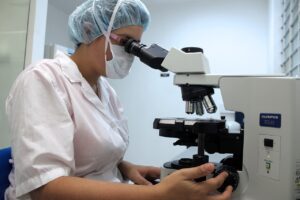Gastroesophageal Junction Carcinoma
What is gastroesophageal junction carcinoma?
Gastroesophageal (GE) junction carcinoma is a rare form of esophageal cancer. It forms out of the cells that create mucus in the GE junction, which is the area that joins the stomach and esophagus. There are three types of this cancer, and they depend on the exact location of the cancer in relation to this junction. Caucasion males are most likely to be impacted by this cancer.
What are the symptoms of gastroesophageal junction carcinoma?
Possible symptoms of this cancer include:
- Unintentional weight loss
- Hoarse voice
- Issues with swallowing and eating
- Pressure and/or burning in the chest
- Anemia-like symptoms (pale skin, fatigue, shortness of breath)
What causes gastroesophageal junction carcinoma?
Like many forms of cancer, doctors are unsure what the exact cause is. However, they have identified a number of risk factors. These include smoking, obesity, gastroesophageal reflux disease, a diet that lacks fruit and vegetables, and Barrett’s esophagus.
How is gastroesophageal junction carcinoma diagnosed?
Doctors’ first step is to look for the characteristic symptoms and review medical history. The next step is a physical exam, which can be followed by an endoscopy, upper GI series, PET scan, and CT scan.
What are the treatments for gastroesophageal junction carcinoma?
Doctors will base treatment on overall health, the type of cancer, and if the cancer has spread. If one’s cancer is localized, the first treatment option is often esophagectomy surgery, which removes the tumor, part of the esophagus, the surrounding lymph nodes, and possibly part of the stomach before reconnecting the esophagus and stomach. Other treatment options include esophageal dilation, chemotherapy, radiation, and targeted therapy.
Where can I find out more about gastroesophageal junction carcinoma?
GE Junction Carcinoma Articles
Encouraging Findings in Phase 2 Gastric Cancer Clinical Trial

Pembrolizumab Combo Fails to Reach Endpoint in Gastroesophageal Junction Cancer Trial

Positive Results Available on Keytruda Combination for Gastric Cancer and GE Junction Carcinoma

Early Weight Loss Linked to Lower Gastroesophageal Junction Carcinoma Survival Rates

Study of the Week: Early GI Cancer Screening is Recommended for Primary Immunodeficiency Patients

A Clinical Trial Confirms That Nivolumab Plus Chemotherapy Outperforms Immunotherapy Alone In Gastric Cancer Treatment

Discussion: Upcoming GEJ Cancer and Gastric Cancer Agents and Biomarkers





